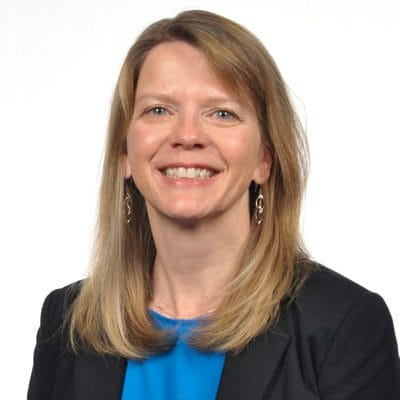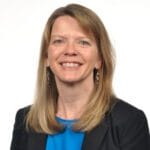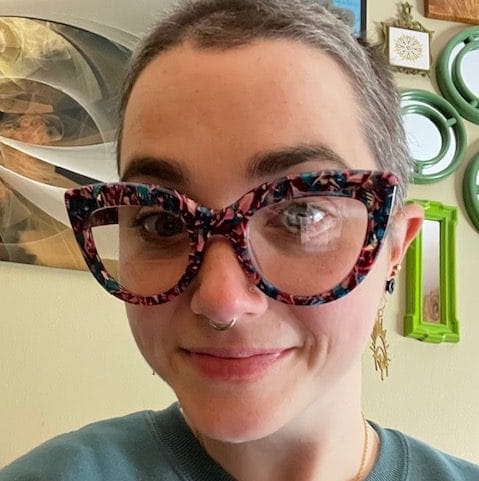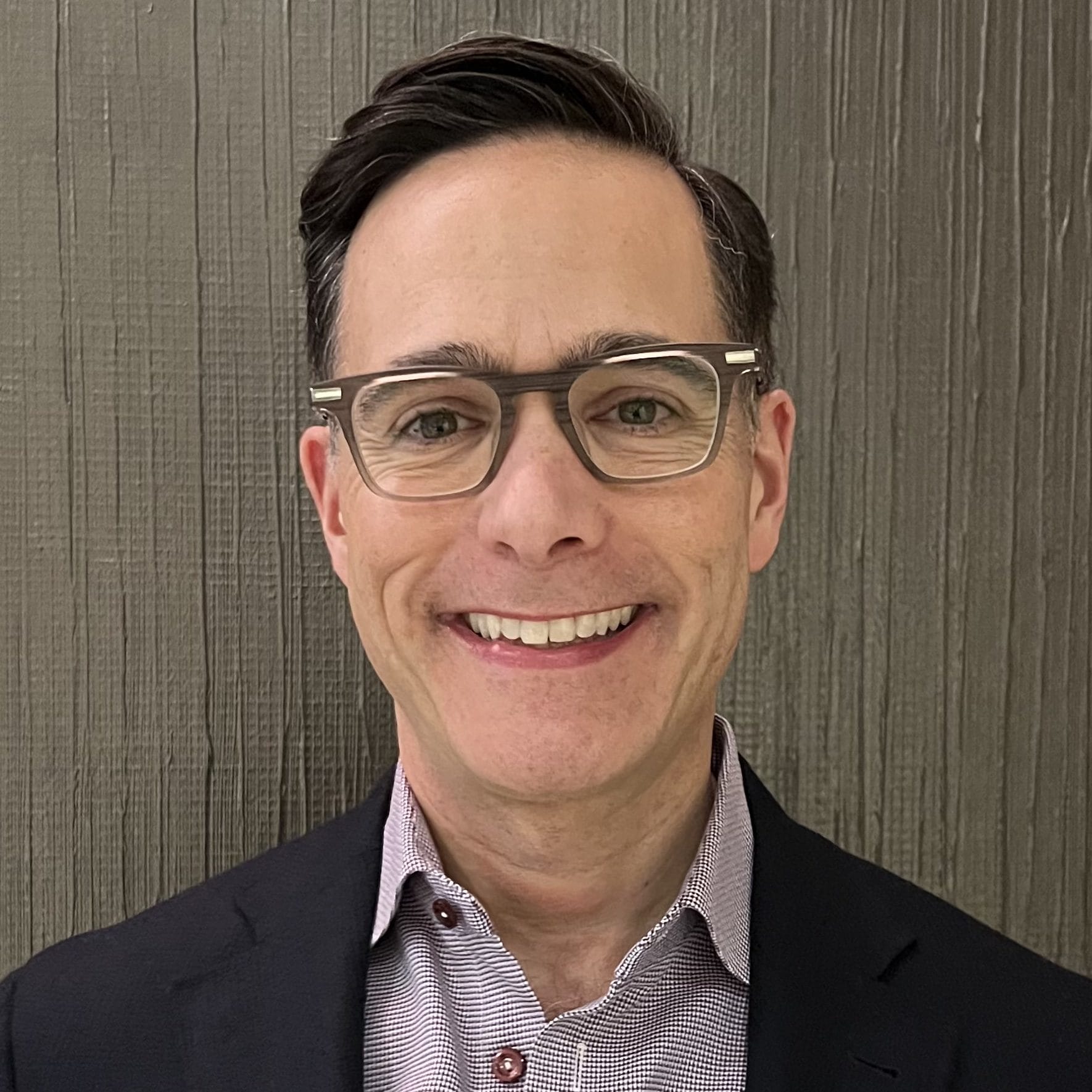
Dr. Julie Dahl pioneers award-winning language instruction for adult learners
Dahl’s online language courses incorporate instructional videos and recordings of native Spanish speakers with live virtual sessions where students practice conversing in Spanish.
Megan Fucile had wanted to return to Spanish class for years.
She’d studied Spanish in high school and done well enough to test out of the world language requirement in college. But there was always a “little hole in her heart” telling her that she should return to the classroom, where she knew she would learn the language best.
Fucile got her opportunity when she learned about the language program offered through Continuing Studies at the University of Wisconsin–Madison. Unbeknownst to her, the program’s virtual Spanish courses had recently undergone a significant overhaul, thanks to Languages Executive Director Dr. Julie Dahl.
The courses — and Dahl’s instruction — proved to be an educational revelation to Fucile. “It’s so obvious that Julie understands that there are many ways to learn, and she hits all of them in every lesson,” says Fucile, who recently completed her third course with Dahl.
Fucile isn’t the only one raving about Dahl’s virtual Spanish courses. Last fall, the Association for Distance Education and Independent Learning (ADEIL) awarded her the 2023 Noncredit Course of the Year award for her updated Spanish 1 curriculum. Award committee reviewers cited Dahl’s meticulous design for adult learners and its immediate practical application of Spanish skills. “This is not just a theoretical journey, but a real-world preparation for learners,” wrote the award committee. “And the proof is in the student feedback, which consistently attests to the value and effectiveness of this exceptional course.”
Real-world preparation
Dahl’s focus on teaching adult language learners was at the heart of her quest to offer better instruction. She began by asking her students what topics they most wanted to communicate about — such as family, career or travel — and centered the curriculum’s conversation, reading and writing exercises around them.

“I thought about what I want them to be able to communicate in Spanish by the end of each course,” Dahl says of her revised approach, “and I worked backward from the beginning to scaffold up to that goal.”
She also applied the “flipped classroom” model to her courses. Students now complete grammar and conversation lessons asynchronously by watching videos of Spanish instructors and listening to audio recordings of native Spanish speakers from different countries. Students use their live class time to practice speaking virtually with their instructor and a small group of classmates.
It was crucial to Dahl in devising the new curriculum that she did not simply repurpose a typical undergraduate language course for adult learners.
“Adult students are not in the classroom 3-5 days a week,” she explains. “It’s not their job to learn a language, and they’re not here to earn academic credits towards a degree. They’re here to learn a language for something more personal, whether it’s a relationship with a Spanish speaker, their job, travel or to stay mentally active and learn something new.”
A language reawakening
Megan Fucile’s reason for returning to Spanish was motivated by the desire to finish what she’d started in high school, but her work at an insurance company made it happen.
“I was working remotely for an agent who lives in coastal Virginia, where there’s a large Spanish-speaking population,” recalls Fucile, who lives in Eau Claire, Wisconsin. “The agent there had a Latin name but did not speak Spanish. But because of his cultural identity, this population of Spanish speakers came to our agency. I felt like they were being underserved because our office couldn’t communicate well with them.”

Shortly after, Fucile transferred to work for an agent in Wisconsin, where she again noticed an opportunity to improve communications with Spanish-speaking clients. She broached the topic of resuming her Spanish studies with the new agent, who was so enthusiastic about the idea that she offered to pay for Fucile’s coursework.
Dahl’s courses offered the perfect opportunity for Fucile to pick up her Spanish learning as a working adult with three children under 10 and a busy life. “It’s hard to grapple with being an adult learner,” she says. “It’s scary to realize it doesn’t come to you as easily as in high school. Julie breaks the learning into small chunks, which makes the content very manageable and prevents you from being overwhelmed.”
One of the best parts of Dahl’s courses, Fucile says, is how she normalizes the psychology of learning a language as an adult.
“Julie acknowledges the messiness and discomfort that sometimes come with learning a language. She reinforces that it’s not about perfection; it’s about exposure and growing together with our classmates.”
Fucile reports that her new Spanish language skills are making a difference at work and home.
“I haven’t closed any accounts at work entirely in Spanish,” she says, “But I have more confidence to use Spanish with our Spanish-speaking clients, and I think that they appreciate that I’m attempting to step into their world, even if it’s a little bumpy.”
At home, she says her three children also see her working at learning Spanish. “My 6-year-old did a bilingual camp over the summer. She’s especially motivated to learn a language because she sees me doing it.”
From semester abroad to continuing education
Early educational experiences also inspired David Germaine to revisit his Spanish language learning.
A Chicago attorney who has completed six Spanish courses at UW–Madison Continuing Studies — four of them with Dahl — says memories of a semester abroad and a Spanish course during his senior year as an undergraduate stuck with him over the years.

“In the last couple of years, I have been traveling to Spain more frequently and am hoping to spend more time there in the future, so I’m working on my language skills now,” he says. His recent coursework has also helped him find opportunities to use his Spanish skills in his daily life, whether it’s joking with a coworker or listening to music.
Germaine says he appreciates the thought Dahl has put into designing Spanish courses for adults.
“Adult learners have varying amounts of time to commit to a Spanish class in a given week,” he notes. “The Continuing Studies Spanish classes at UW account for this by giving you three paths to experience the coursework: a workbook, video exercises and virtual conversation with classmates.”
Most weeks, Germaine says he can get through all of the assignments, but the cross-channel curriculum allows him to keep up with the course’s progression and participate, even during the weeks when he has less time.
He describes the revised Spanish course design as “genius” and credits Dahl for her attention to every instructional detail. “She listens and is flexible,” Germaine says of her. “She is consistently willing to adapt and bend her instruction in a way for the students to succeed.”
Engaging adults
Helping adult students succeed has been central to Dahl’s work since she started at the UW–Continuing Studies language program 11 years ago.
She’s taught Spanish at various levels for over 25 years and enjoys teaching adult learners.
“Their sense of satisfaction comes purely from learning a language,” Dahl says. “As an instructor, this is more rewarding — and challenging. I have to keep the courses engaging so the students want to return.”
As with most instruction, the COVID pandemic accelerated the transition of Continuing Studies courses to a fully online format. Though she had been resistant to teaching virtually before the pandemic, Dahl said it ultimately forced her team to devise a better program for teaching all language courses.
“People talk more in our online classes than our in-person classes,” says Dahl. “Conversation groups are kept small — no more than six students for beginning courses or 12 for higher-level courses. The students are more willing to take risks this way, which is important when learning a language, especially as an adult.”
She also delights in the sense of community that students invariably build online. “Our language students are incredibly diverse in age, background, life experience and career,” she says, “but they come together with this real motivation, a curiosity about the world and the desire to learn together.”
It’s a formula that works: The language program has grown, enrolling nearly 1,600 students last year alone. Dahl is already planning to apply her award-winning Spanish course curriculum to the other languages offered by Continuing Studies — French, German, Italian and Portuguese.
She said her award from ADEIL has been a galvanizing recognition for her and the other administrators and instructors who worked hard to develop the new curriculum for Spanish.
“It’s a vote of encouragement that what we’re doing is unique,” Dahl says. “And that we’re on the right track.”
Please visit the Continuing Studies languages program for more information about available online and in-person courses. You may email Julie Dahl at [email protected].
Published on Jan 30 2024
Categories: Continuing education, News
Tags: awards and recognition, faculty and staff, languages, online education
Previous Post
Unraveling the power of professional coaching